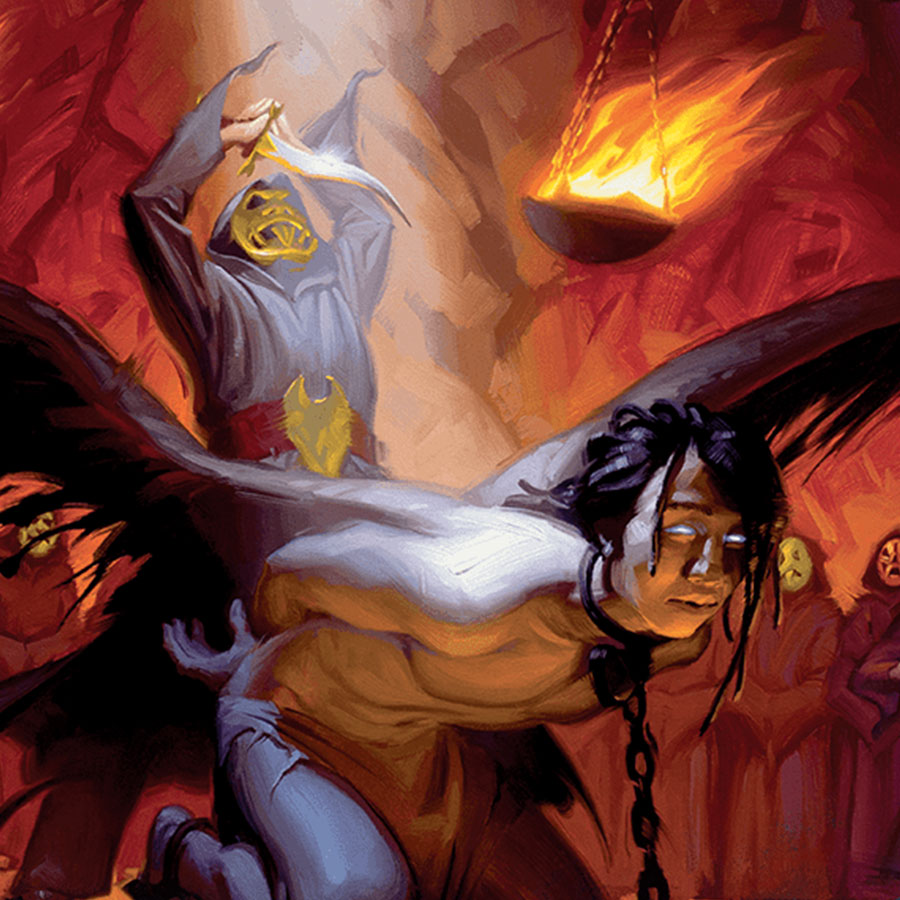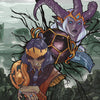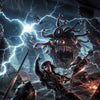3 Ways to Overcome Dungeon Master Anxiety and Fear

Written by Luke Hart
Every dungeon master has experienced some amount of fear or anxiety before a game or during. I know that I sure have. For me it usually happens during convention games when I'm game mastering for folks that I don't know.
And I suspect that this fear or anxiety may be a reason that many people who are interested in being a dungeon master and think that it might be a lot of fun, never take the plunge and give it a try. And I think that is very unfortunate because not only will there always be a need for more dungeon masters, but the fact is that DMing is tons of fun--Way more fun than being a player.
Watch or listen to this article by clicking the video below.
The first thing that I want to make very clear is that I am not a licensed therapist. I am simply sharing what I have learned about overcoming anxiety in the context of running D&D games, and what I have learned experientially while dealing with some general anxiety that I have had in my life. Remember, I am just a dude with a blog, and I am no substitute for professional help, if that’s what you need.
Structured Problem Solving
The first tool that I want to share with you is something called structured problem solving. Now anxiety is often caused by feelings of powerlessness, loss of control, fear of a specific thing or situation, or just a heightened flight reflex within someone. And this tool can be used to counteract or even remove some of those sources of anxiety, in the context of running a D&D game.
The first step in structured problem solving is identifying what is causing your anxiety. If your answer is “running the game” in general, break it down into smaller more specific elements. And then you address each of these elements directly and separately from the others, seeking to establish power or control over that element.
Now that probably doesn't make a whole lot of sense quite yet, which is why we're going to go over several examples. And for our examples we're going to address the elements of running a game that I think are most likely to cause anxiety or fear.
#1 What If Scenarios
What else one cause of anxiety can be the uncertainty of what to do if your players do certain things. These are the what if scenarios. What do I do if my players leave town and travel to that other town? What do I do if my players attack that NPC? What do I do if my players don't take that quest?
Because of the freeform sandbox nature of D&D, players can pretty much do anything that they decide to do, and it's then left to the dungeon master to figure out what happens and how that works. Now the easy answer here is to simply tell you to improvise, and to try to get better at improvising. In fact, I have an entire video dedicated to tips and tricks to becoming a better improviser in your D&D games.
However, I have found that one of the best solutions to handling what if scenarios is to simply prepare more. When I have my adventure or town or whatever more fully fleshed out, I'm better able to handle what if scenarios and improvise as needed. It's not that you're literally preparing everything, because you're not. It's rather that the more you know about something, the more you are an expert on the thing, the easier it is to improvise. And of course, because you've prepped more, the chances of unexpected situations happening are reduced.
So, that's an example of how structured problem solving would work. We identify the specific element, what if scenarios, and then we brainstorm and establish solutions for that problem. Specifically, we're trying to establish solutions that reduce our anxiety or fear.
#2 Making Rules Calls
So as another example, a common source of anxiety for dungeon master’s is making rules calls. You have players looking to you as the expert on the rules, and perhaps even arguing about the rules with you. So how can we reduce anxiety there? And remember We want to establish power and a sense of control in this element.
So, for making rules calls, the first thing that you should seek to do is learn the rules. The better you know the rules, the better equipped you will be to make calls on the fly. Study the rules. Look for commonalities in the rules that identify the core principles of the games design so that you can exercise those core principles when making your own calls. Look for gaps in the rules during your study and think of hypothetical scenarios where they might apply and think about how you'd address them.
The bottom line is that the more comfortable you become with the rules and the more familiar you become with making calls in the moment, the less intimidating it will seem.
Which leads us to a sub point. The more you do a thing, and the more comfortable you become with it, the less likely you are to feel anxious about it because you know that there is nothing to fear. You will have a sense of knowledge and control in that area because you've done it so many times before and you've become good at it.
#3 Speaking in Character
This source of anxiety can easily be solved for. Just don't do it. Speaking in character and especially speaking in special voices or accents is not required at all. Many amazing game masters never speak in special voices. And I know a game master who really only has two voices that he can use. One is a high-pitched feminine voice, and the other is a low pitched gruff masculine voice. But that's all he's got. And his games are still lots of fun.
The next way to solve this is to speak in character but to not change your voice at all. That way you can carry on a conversation with the players characters without any pressure to do some fancy voice acting or something. Not that any of us are really any good at it, even though we like to think that we are. We're really all just fumbling through it and hoping that nobody ever records it on camera. LOL
Now if you do want to do special voices or accents, then the solution is to research and practice. I was once asked to do a Russian accent for a friend's Kickstarter video. So, the first thing that I did is I did some research on a Russian accent and listened to some YouTube videos explaining how to do it. Then I did a bunch of practicing. And I'm still not very good at it. But I did my best.
I also want to say that accents in your fantasy world are probably completely different than accents in our real world. So, who says that you need to speak with a Scottish accent for dwarves, or a Russian accent for vampires or whatever.
Oh, and the best way to practice in my opinion is to literally carry on a conversation with yourself in the accent. You might literally be practicing the portrayal of the NPC that will be speaking with that accent. And just have a 15-minute conversation with yourself in that accent.
#4 Handling Complex Social Situations
Now for me personally handling complex social situations is probably the most likely to induce anxiety. I'm not an anxious person although I did have a panic attack once and subsequently struggled with anxiety for about a year, though now I’m fine. However, even for me dealing with social situations such as problem players can cause a little bit of trepidation. The thing is that even people who aren't subject to heightened anxiety under normal circumstances often have issues with interpersonal conflict.
So, when conflict arises in your D&D game these are my suggestions.
First, conflict is easier to address early in the situation. The longer you let the issue continue, the more the problem player will feel safe and justified in their actions. After all, if you let them get away with a thing for months or years, why are you “suddenly” coming after them?
Next, conflict is easier dealt with as a group. This is why, I suspect, that interventions are popular. So, if you don't feel comfortable addressing a conflict one-on-one with a person, do it in the context of the group. In fact, one might argue that it is the group's responsibility to deal with problems in the group, and not just the game masters. However, the game master as the leader of the group, should take the lead.
Also, be sure that you are addressing the problem from a point of understanding. In many cases the problem player may not even realize that there is a problem, and they may not be doing it intentionally or maliciously. I recommend being kind, compassionate, firm, and direct when addressing an issue. And yes, it is possible for all of those to exist together. Don't approach the issue with anger, and don't beat around the bush.
Now, there's a lot more that I could say on this topic, but my goal here is really to just give an example. If you're looking for more help with dealing with problem players, then I have a dedicated video on the topic that you can watch right here.
The Three-Three-Three Rule
OK now I want to talk about two specific non-D&D specific tools that have worked for me to reduce anxiety. The first one is called the three-three-three rule. This tool helps you mitigate anxiety by shifting your focus away from the anxiety you're feeling in the moment and directing your focus to something else.
Step one. Identify three things that you can see. Ideally say them out loud but if you can't say them to yourself.
Step two. Identify 3 sounds that you can hear.
Step three. Move three different parts of your body.
And I'm pretty sure there are variations of this as well. The one that I have used the most is where you focus objects in the room around you and then say their colors. It's possible of course that this is a different tool that I'm confusing with this tool, but the point is that it helps.
The 4-7-8 Breathing Technique
Now this is actually my favorite anxiety reduction tool. I occasionally suffer from heart palpitations or skipped heartbeats--well according to my doctor my heart isn't actually skipping it just has a very soft beat followed by a very hard beat and it makes it seem like it's skipping; There's actually a medical term for it that I just can't remember for the life of me. But my point is that when I have these palpitations, I use this breathing technique to reduce my anxiety and get through the periods when I'm dealing with these palpitations. And let me tell you what, I suspect that having heart issues has got to be near the top of the list of things that cause anxiety, especially when it feels like your heart might be stopping.
Anyway, this is how the breathing technique works. You take a deep breath for over 4 seconds. Then you hold your breath for seven seconds. And then you exhale that breath for 8 seconds. And the trick is that you want to count the seconds in your head. There's something about slowing down your breathing that helps with anxiety, and I also think that counting the seconds helps too because it takes your mind off your anxiety and gives you something else to focus on.
100 Years of GM Experience at Your Fingertips!
Are you a NEW GAME MASTER feeling a bit overwhelmed by everything involved with running a role-playing game? Are you a VETERAN GAME MASTER looking for new tips and tricks to take your games to the next level? Look no further than the Secret Art of Game Mastery.
We at the DM Lair have distilled our CENTURY of accumulated GM experience into an easy-to-read guide of practical advice that you can immediately apply to your games! We've even included our own templates–the things that we use to prepare our ACTUAL games.
Get all three books to master your game:
- The Secret Art of Game Mastery. Contains over 100 years of GM advice distilled into an easy-to-read format. It introduces and explains the tools of the trade, scheduling, playstyle, post-game notes, getting player feedback, and more.
- The Secret Art of Preparation. Brings to your fingertips the actual templates and guides that the DM Lair team uses to prepare games, Lair Magazine, and more. Designed as a three-ring binder, it's intended for you to write directly into for your entire campaign!
- The Secret Art of Notetaking. Gives you the keys to tracking your campaign from session to session just like the DM Lair team. Designed as a three-ring binder, it's intended for you to write in and keep track of your whole campaign!
With so much knowledge and experience on its pages, The Secret Art of Game Mastery is guaranteed to become an indispensable tool for all game masters, new and veteran alike. And if that isn’t enough, the information applies to all game systems and all genres!
-
Posted in
Game Master How-To Articles







